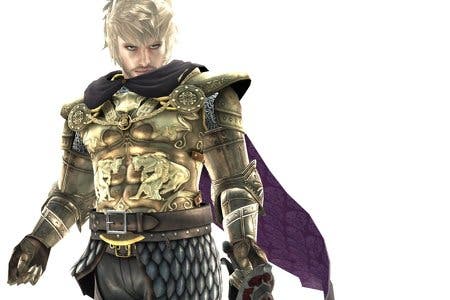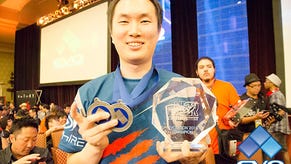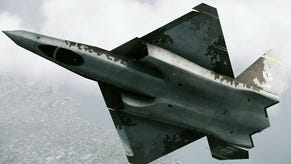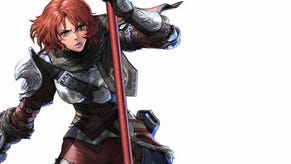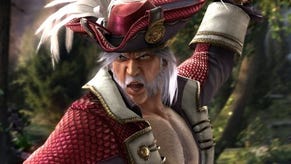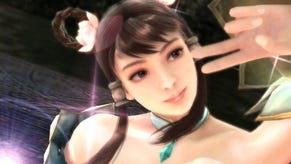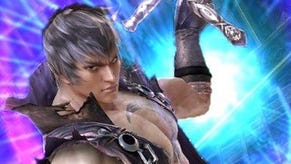Game of the Week: SoulCalibur 5
The soul still burns.
Is Japan getting its groove back? Leaving Nintendo aside (or maybe not, even), the major houses of the great motor and innovator of the video games industry in the eighties and nineties have been in the doldrums. Sega, Capcom, Konami, Square, Namco: evocative names that have seen either dwindling fortunes, uncertain moves into Western co-development, or both.
Looking at 2012's slate, though - and at this week's new releases - there are reasons to be cheerful. I'm not about to predict a dramatic financial turnaround for any of these companies. But I do predict something that might matter more to us as game fans: they're going to start behaving like themselves again.
Plantinum's Vanquish and Bayonetta thrilled us so much because they had all the preposterous cool, flair and surreal finesse that we associate with the Japanese games industry in its pomp - but that have been hard to find in the watered-down or water-treading products of the last half-decade. But that sense of self is coming back.
You can see it in the magnificently mental Asura's Wrath, due from Capcom and CyberConnect 2 soon. You can see it in the almost satirical set-up of Sega's Binary Domain, pitting the bland heroes of a dumb US shooter against the beautiful, gleaming robots of corporate Nippon gone mad. You can see it in the wild ambition of the Resident Evil 6 trailer and release date, Capcom gunning for the big boys in the November title fight. You can see it, of course, in Platinum's thrillingly stupid Metal Gear Rising, which promises to pay extravagant tribute to the Japanese industry's great showman, Hideo Kojima.
You can get a great refresher on Kojima's work from this week's Metal Gear Solid HD Collection. "More esoteric and cerebral than the pro-war action movies from which they draw so heavily, Metal Gear Solid games are equal parts melodrama, political thriller, science-fiction, whimsical meta-humour and surreal theatrics. They're as much war games as Twin Peaks is a police procedural," Jeffrey wrote in our review.
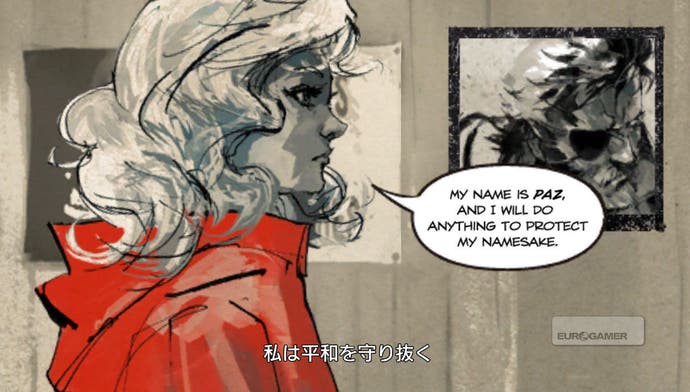
"Metal Gear Solid is a potpourri of ideas that insists you take the good with the bad. Certainly indulgent, it's also melancholy, exhilarating, clever, and ludicrous. It's never entirely clear what, if anything, Kojima and company are taking seriously - and the end result, in this collection, is a fascinating chronicle of one of video games' strangest successes."
Konami's also responsible for NeverDead this week, and though no-one could actually call this collaboration with Rebellion a good game, it's got character to spare - a recklessly barmy je ne sais quoi that certainly doesn't come from the journeyman Oxford studio. This is one of the few hands-across-the-ocean games that the culture clash has made more interesting, not less. Put it this way, it's no Dark Void.
"'Yeah, so I heard that in NeverDead, you can rip your own head off and use it to roll through ventilation shafts,'" wrote Donlan in our review, apparently summoning his inner gum-chewing valley girl (would). "'I heard you can attach your head to your severed limbs and just wobble around on the floor kneecapping demons with your twin pistols. I heard you can pluck your right arm off and then throw it, still clutching an Uzi, into the mouth of a giant boss, so that he'll swallow it and you can then shoot him from the inside and the outside at the same time.' Princess, you heard right."
Even though it's a better game, all told, the bum note this week is sounded by Square Enix's Final Fantasy 13-2. The great RPG series is getting lost in a confused and inward-facing attempt to force a square peg into a round hole and then clean up the resulting mess. Although this sequel is an explicit attempt to answer criticisms levelled at the first game, it's telling that most reviewers felt more or less the same about it.
"For all its mechanical cleverness and forward-thinking design, Final Fantasy 13-2 is also convoluted, complicated and unfriendly to newcomers," wrote Simon in our review. "In Square-Enix's desperation to discover what its flagship series looks like in the modern world, what should be an interesting curio has been inflated to blockbuster proportions. Hurling money at a development team that has been labouring without firm creative leadership for close to a decade now has led to a game that is, in many ways, as disjointed as its world, as rambling as its lead character. In those fragments excellence, confusion, beauty, strangeness, wonder and loss may all be found."
Final Fantasy is emblematic of the identity crisis Japanese development has been suffering, shaken by its loss of importance. A major part of that has been the death of the arcade - and that's why the current renaissance in fighting games, including our game of the week, is such an encouraging sign.
SoulCalibur 5
The previous game had to justify its existence with Star Wars; Assassin's Creed's Ezio is an altogether more graceful guest star for Namco's fluid fighter. I guess because, like the all the best cameos, it seems like it's an honour to both parties.
It's not a major reversal of fortunes, this, but it's a game with improved systems, less gimmickry, more style and more substance - a game that's taking a step back towards the breathless purity of the Dreamcast game, not away from it. A game whose moment has come, with the ample single-player content and customisation options fitting the needs of the modern, connected fighter so perfectly.
"SoulCalibur has always excelled at offering an accessible style of combat with a level of single-player content that other fighting games have only recently begun to match," wrote Matt in our SoulCalibur 5 review. "These qualities haven't changed - and now, after what seemed like an uncertain return, the historical fighter is staging its best performance since that fateful Christmas of 1999. High five!"
In other words, SoulCalibur can be itself again. It's all we ever wanted from it - and all we want from Japanese games, too.
